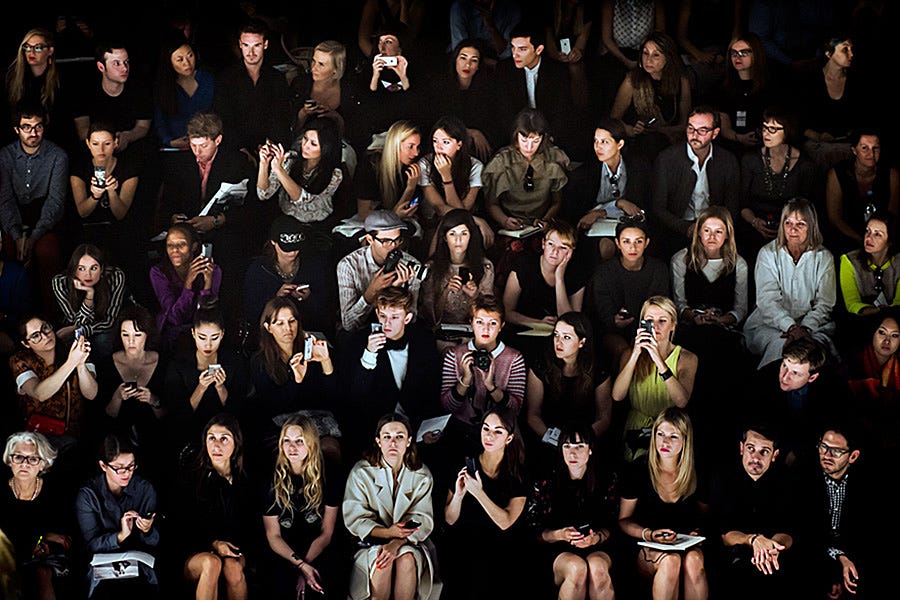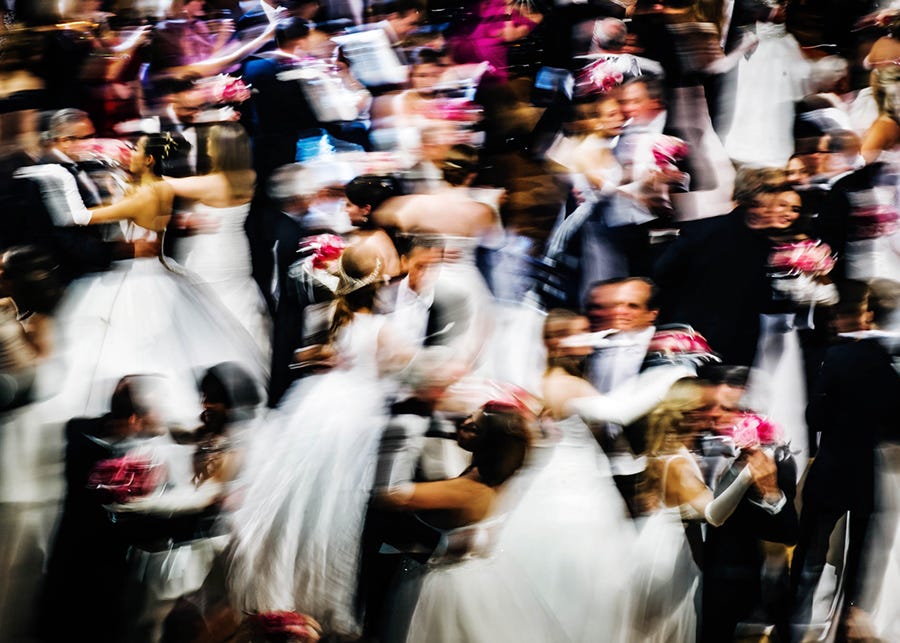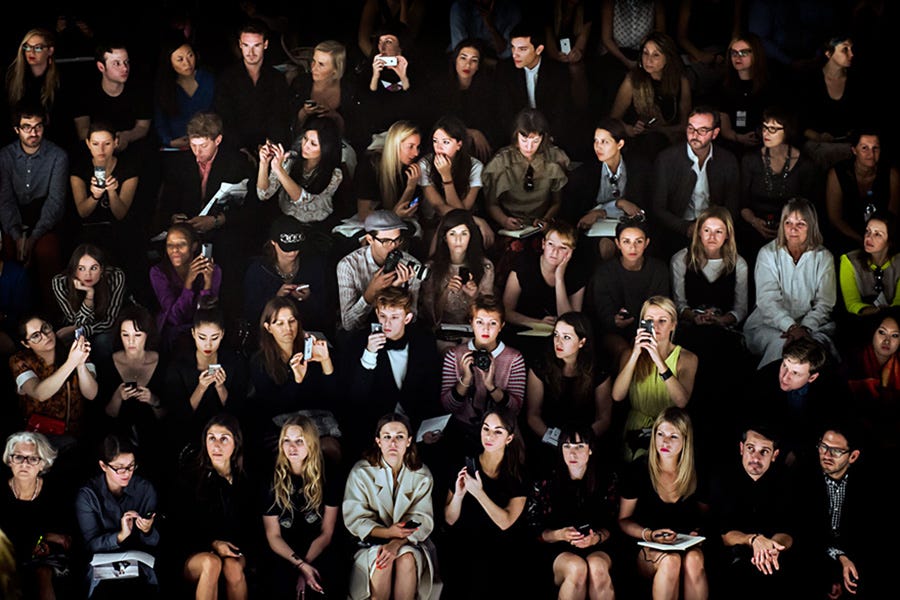Photography's Phallic Stage or Why Photographers Should Stop Calling Themselves "Artists"
Unpacking photography's biggest inferiority complex.
Welcome to In the Flash, a weekly, behind-the-lens dialogue on photography. To join the conversation
I was scrolling through Twitter when I came upon a question, "To all photographers out there, do you consider yourself an artist or a photographer?" This ought to be good, I thought. And, sure enough, the thread was exactly as I anticipated. Most people emphatically rejected the term "photographer" as if it were a derogatory mark of a lower caste. Some seemed insulted to even be asked, "Of course I am an artist since I don't shoot weddings!"
Ahh, weddings. The blue-collar bastard child of the photography world. There are few worse things you can do as a professional photographer. If shooting covers for big magazines is the Mount Olympus, photographing weddings is like cleaning bird droppings from the base of the mountain. Almost every other endeavor can be excused. There is dignity to be found in product photography, in boudoir (provoking a delicate mix of disdain and envy), in headshots, in commercial work. In weddings, however, there is only derision. I've heard student photographers proudly announce that they will put themselves through school by waitressing but would never stoop to shooting weddings.
Growing up I wanted to be a painter. Decent amount of drawing skills and the customary overestimation of such talents by my parents led me to believe that this was my destiny. But it just wasn't an option in a Soviet immigrant family where from infancy I was designated either to become a doctor or to marry one. Yet my parents made one vital mistake. As I was about to head to med school, my mom gave me a digital Nikon for my birthday. It was my first camera. For a very long time my parents wished they had given me something, anything else as I quickly abandoned their dreams of an illustrious medical career. Instead, I started shooting weddings.
At the time, no one told me about the stigma of weddings. They paid well, I got to travel to destinations from Greece to Mexico, and there was a lot of free food. I thought it was glorious. Then I went to art school to get my MFA in photography and learned that I was playing my career wrong. I also learned that the proper way to call myself wasn't a photographer, it was an artist. That's when I rebelled.
In Russian, my first language, the word "artist" is used quite differently. Unless someone is working in more than one discipline, people describe themselves solely as a photographer, painter, actor, musician. Those labels carry pride, while "artist" on its own can sound vague and a bit pompous. It's less a way describing what you do than giving your work value. In short, it's self-congratulatory. Even though I've been here most of my life and English is now my main language, I have never gotten over this subtle distinction. Calling myself an artist still makes me feel a bit cringey.
Since the invention of the first camera in the 1820s, photography has been marred by a trope that photographers are unsuccessful painters (true in my case). While that's been slowly fading, photography is just past the age of a toddler when compared to other art forms. In Freud's world, it has successfully entered the Phallic stage. Still resolving its attachment to the parent, Painting, the medium is going full-throttle through complex phases of rivalry, jealousy and identification.
There is no greater compliment a viewer can pay to a photograph than to compare it to a painting. The Old Masters still reign supreme in dictating aesthetic taste. Caravaggio's chiaroscuro, Rembrandt’s lighting, Vermeer's mood remain the Platonic ideals of artistic aspirations. Painting is so well established as an art form that the standards of what is 'good' are burned in our psyche. It's Pop Culture in High Culture's clothing. People would consider you a barbarian if you weren't familiar with Picasso, Da Vinci, Van Gogh. But I know Ivy League graduates who can't name a single living or dead photographer. And it's no wonder. Photography is not yet part of the cultural curriculum. The Met Museum boasts a small photography room that's more of a transit point by a gift-shop than a stand-alone gallery. Out of hundreds of art galleries in NYC, only a handful specialize in photography and, when they do, it most often looks like painting.
It's not surprising that photographers gravitate towards imitating Painting while trying to compete with it for fame and glory. We are still clinging to the mother skirt of the Old Masters, terrified to let go, uncomfortable to call ourselves merely photographers and not "artists."
Photography exists in a strange space, torn between its allegiance to the past and the possibilities of the future. To let go of the tyranny of Painting we need to get through this damn Phallic stage first. Photography is kicking and screaming and throwing hissy fits as it makes its way through Instagram to imminent dominance as an art form.
And weddings? Their bad reputation reflects photography's insecurity with itself. Shooting weddings is work for hire, but the client is the hoi polloi and subject is a manufactured, bourgeois celebration of consumerism. The worst part is that it pays too well to be considered a proper vocation for a "starving artist," a romantic ideal passed down to us from painting. As a novice photographer, I learned a whole lot from my wedding bootcamp: how to compose, how to experiment, how to direct a group of people and how to stay creative under pressure. Weddings were an invaluable part of my education as an artist.
Just joking.
I am, quite proudly, a photographer.
Find me on Instagram, @dina_litovsky







I love this. Part rant, part philosophical treatise. I love your work as well. Your photography, and yes, your art. A rose by any other name would smell as sweet, no? I think photographers are generally thought of as more technicians than craftspeople or artists. Thus the first question always asked: what do you shoot with? Imagine anyone asking Toni Morrison "What do you type with?" As if the machine and not the mind is responsible for the imagination and craft of composing it into art. I'll never forget the first photos I shared with my wife shortly after taking on photography. "You sure bought a really nice camera, didn't you?" Was her response. Don't worry, we are still married. She supports me in full. But nonetheless, "Forgive them," I say to myself when this happens, "for they know not what the Fuck they talk about."
Keep writing, keep shooting, keep marrying the two as one. 👊🏼
I'm neither a professional photographer, nor an artist. I simply have a desire to express myself creatively and record memories and events that are meaningful to me and mine and enjoyable to look at. I've shot two weddings, both back in the late '60s. The first for a classmate. I wasn't the official photographer, although I may have gotten some payment. I liked shooting candid photos, and I still have some from that wedding that I printed on Agfa Bovira. Almost 60 years later, they still look great. The second wedding was different. The parents wanted a cheap photographer, and that's exactly what they got. I had explained that I was a candid photographer and a friend of the bride, not a professional. Of course, no one was happy with the end results. I have a friend who is a pro and routinely does weddings. She takes wonderful pix, and her clients are happy. And I'm glad there are people like her that enjoy such work and can make good money doing it :).
Art or not, you do great work, please keep it up! :)